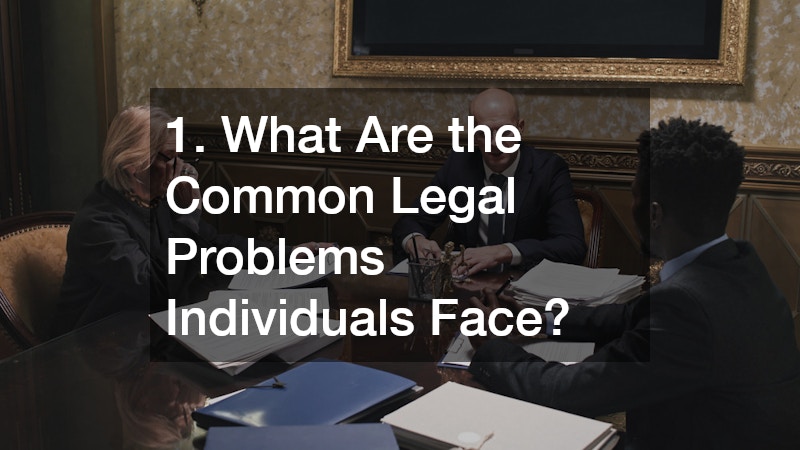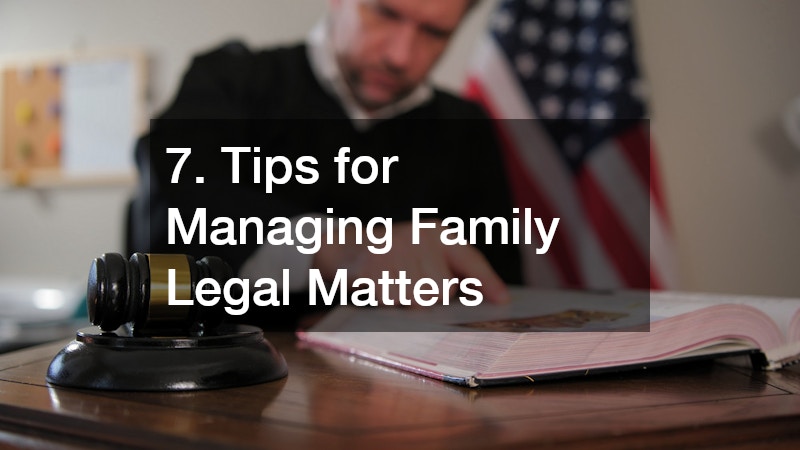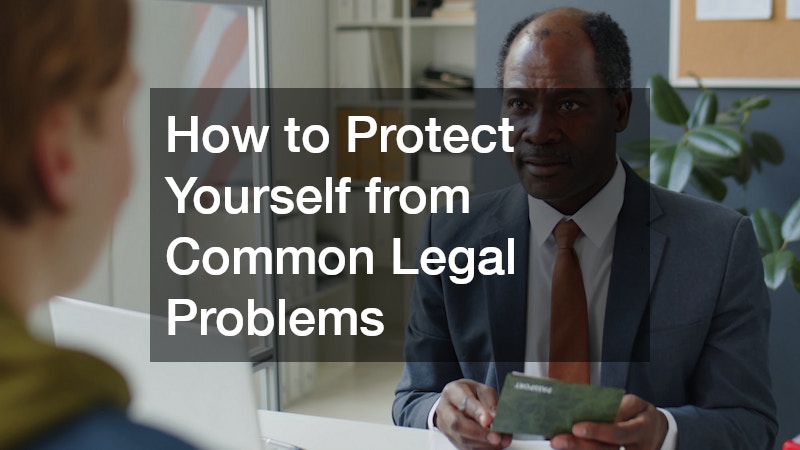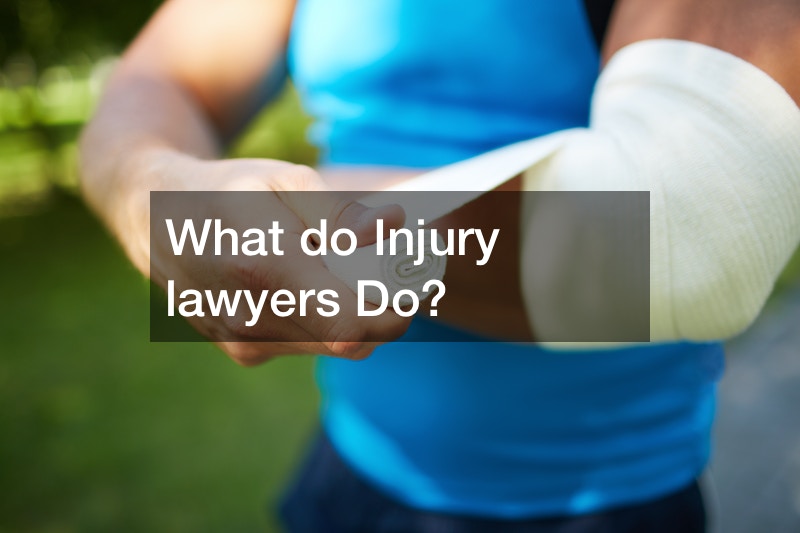
In today’s complex world, legal issues can arise unexpectedly—from disputes over contracts to family disagreements or even identity theft. Understanding common legal problems and learning how to prevent them is essential for maintaining personal and financial stability. Many individuals don’t realize how easy it is to find themselves entangled in a legal matter until it’s too late. Whether it involves employment issues, property disputes, or consumer complaints, the cost of legal problems can be both financial and emotional.
Fortunately, by taking proactive steps, you can minimize your exposure to legal risks. Awareness, proper documentation, and professional guidance can make all the difference in navigating legal challenges confidently. This article explores the most common legal problems individuals face and provides practical strategies to help you safeguard your rights. With the right knowledge and resources, you can make informed decisions that prevent minor issues from escalating into major disputes.
1. What Are the Common Legal Problems Individuals Face?

Legal problems often arise from everyday interactions—family matters, business dealings, employment relationships, and financial transactions. Some of the most frequent issues include property disputes, contract misunderstandings, debt collection, and workplace grievances. Family-related concerns such as divorce, child custody, and inheritance disputes also rank high on the list of common legal challenges.
A family attorney can help you navigate these sensitive matters by ensuring that your rights and obligations are clear and protected. They provide legal representation in divorce proceedings, adoption cases, and child support arrangements, helping families reach fair and sustainable outcomes.
Another prevalent issue is the lack of understanding of legal contracts. Many people sign documents without reading or comprehending the fine print, which can lead to disputes later. Having agreements reviewed by a legal professional before signing can save significant time and money. Additionally, maintaining organized records, such as receipts, contracts, and communication logs, is crucial when resolving disputes or proving compliance.
By anticipating potential legal issues and seeking legal advice early, individuals can prevent many problems from escalating into expensive or stressful legal battles.
2. How Can I Protect Myself from Identity Theft?
Identity theft is one of the fastest-growing crimes globally, with millions of victims each year. It occurs when someone unlawfully obtains and uses your personal information—such as your Social Security number, credit card details, or bank account credentials—for financial gain. The consequences can be devastating, including damaged credit, stolen funds, and legal complications that take years to resolve.
To protect yourself, start by safeguarding sensitive information. Use strong, unique passwords for each account and enable two-factor authentication where possible. Avoid sharing personal details over the phone or email unless you’re certain of the recipient’s identity. Regularly review your financial statements and credit reports for unauthorized activity.
If you become a victim of identity theft, consult a personal injury attorney to understand your rights and explore options for compensation if negligence or data breaches contributed to the theft. Attorneys can assist in communicating with creditors, disputing fraudulent charges, and guiding you through the recovery process.
It’s also wise to report incidents to the Federal Trade Commission (FTC) and your local police department. The earlier you act, the better your chances of minimizing long-term damage. With proactive monitoring and professional assistance, you can significantly reduce your risk of identity theft.
3. What Should I Know About Personal Injury Claims?
Personal injury claims arise when someone suffers harm due to another party’s negligence or intentional actions. Common cases include car accidents, workplace injuries, medical malpractice, and slip-and-fall incidents. These situations can lead to physical pain, emotional stress, and financial strain from medical bills or lost income.
Working with local attorneys who specialize in personal injury law ensures that your case is handled efficiently and professionally. They can help determine liability, calculate damages, and negotiate with insurance companies for fair compensation. Many victims attempt to handle claims alone but later discover the complexity of legal paperwork and procedural deadlines.
To protect yourself, always document the incident thoroughly. Take photographs, gather witness statements, and keep copies of medical reports. Avoid making public statements about your case, especially on social media, as these can be used against you.
Most importantly, seek medical attention immediately, even if your injuries seem minor. Medical documentation is essential in supporting your claim. Legal professionals can help ensure you receive proper compensation for medical expenses, rehabilitation, and lost wages, allowing you to focus on recovery.
4. How to Handle Landlord-Tenant Disputes?

Landlord-tenant disagreements are common and often stem from issues like unpaid rent, lease violations, maintenance disputes, or property damage. Both parties have legal rights that must be respected, and understanding these rights can help avoid costly court battles.
Before signing a lease, review the terms carefully to ensure they align with your expectations. Keep copies of all rental agreements, payment receipts, and communications with your landlord. These records serve as evidence if conflicts arise.
If you’re facing an eviction or unresolved maintenance issue, an immigration lawyer—who often handles tenant rights cases for clients navigating residency or rental challenges—can provide valuable assistance. They can explain housing laws, represent you in court, and ensure you’re not being taken advantage of, especially if you’re a newcomer unfamiliar with local regulations.
In many cases, mediation can resolve disputes amicably. Tenants and landlords who approach disagreements with clear communication and a willingness to compromise often avoid litigation altogether. Understanding your lease and seeking early legal guidance can prevent misunderstandings and foster positive landlord-tenant relationships.
5. What Are My Options in a Contract Dispute?
Contract disputes occur when one or more parties fail to uphold the terms of an agreement. This can happen in business partnerships, employment contracts, or even home improvement projects. Common causes include unclear language, unmet expectations, or breaches of contract.
If a disagreement arises, begin by reviewing the original document to identify specific obligations and potential loopholes. Maintaining professionalism and clear communication with the other party is crucial. Many contract issues can be resolved through negotiation or mediation, avoiding lengthy legal proceedings.
A franchise lawyer can assist in understanding contract terms, interpreting legal jargon, and advising on the best course of action. Their expertise is especially valuable when dealing with commercial or franchise agreements, where financial stakes are high.
When disputes escalate, formal legal action might be necessary. In such cases, ensure all relevant correspondence and documentation are organized. Courts generally favor parties who can provide detailed records and demonstrate efforts to resolve conflicts amicably.
By consulting an experienced attorney early, you can explore options such as settlement discussions, arbitration, or court litigation—ensuring your contractual rights are preserved.
6. How Can I Avoid Employment Legal Issues?
Employment-related legal problems are among the most common challenges individuals face. Issues such as wrongful termination, wage disputes, workplace harassment, and discrimination can significantly impact a person’s career and mental well-being.
To protect yourself, familiarize yourself with both state and federal labor laws. Document all work-related interactions that could become relevant to a legal claim—such as disciplinary meetings, performance reviews, and communications with supervisors. If you believe your rights are being violated, consult a qualified wills and trust attorney, who often provides guidance on employment-related estate or benefits planning. They can help you understand how employment changes affect your long-term financial security and ensure your assets and income streams remain protected.
Open communication with employers also helps prevent disputes. Employees should review contracts before signing and seek clarification about job roles, benefits, and termination conditions. Employers, in turn, should maintain transparent policies and consistent documentation to safeguard against false claims.
By staying informed and proactive, you can maintain a healthy work environment and protect yourself from potential legal complications in the workplace.
7. Tips for Managing Family Legal Matters

Family-related legal issues are deeply personal and can be emotionally draining. These challenges include divorce, custody battles, adoption processes, and inheritance disputes. Handling such matters with care and legal guidance ensures fair outcomes and lasting family harmony.
When facing major life transitions, seeking the advice of a bankruptcy filing lawyer might seem unexpected but can be surprisingly beneficial. Financial strain often accompanies family legal issues, and bankruptcy experts can help families restructure debts and protect shared assets during difficult times. This is especially helpful when divorce or medical expenses cause significant financial stress.
Clear communication and proper documentation are essential. Keep records of all financial transactions, property ownership documents, and correspondence related to legal proceedings. Mediation is often a cost-effective way to resolve disputes without escalating to court, promoting cooperation and minimizing emotional distress.
For issues involving children, focus on the best interests of the child. Courts typically favor arrangements that promote stability, safety, and emotional well-being. By seeking legal guidance early and maintaining transparency, families can navigate challenging circumstances while preserving important relationships.
8. How to Protect Your Business from Legal Risks?
Business owners face a range of legal challenges, from employee disputes to intellectual property concerns and tax compliance. Understanding these risks and addressing them proactively can prevent serious consequences.
Start by ensuring all business activities comply with local, state, and federal regulations. Keep accurate financial records, use written contracts for every partnership, and maintain appropriate insurance coverage. Establishing clear policies and employee handbooks can also minimize misunderstandings.
Consulting personal injury lawyers can benefit business owners in unexpected ways. These attorneys not only handle injury-related claims but also advise on workplace safety standards and liability prevention. They can help draft policies that protect both employees and the business from potential lawsuits.
By fostering an ethical and transparent business culture, owners can build trust with employees and clients alike. A proactive approach ensures long-term stability and helps prevent costly disputes, allowing you to focus on growth and success.
9. What Should I Know About Consumer Rights?
Every consumer is entitled to fair treatment, accurate product information, and protection against fraud. However, many individuals are unaware of the full extent of their consumer rights. Issues like defective products, false advertising, and unfair billing practices are more common than many realize.
Knowing your rights helps you act quickly when problems arise. Keep copies of receipts, warranties, and correspondence with sellers or service providers. If a business fails to honor its obligations, you may be entitled to a refund, repair, or replacement.
Working with divorce attorneys may seem unrelated to consumer issues, but many of these professionals handle broader civil cases involving property division, asset protection, and contractual disputes. Their experience ensures that you understand the legal steps required to recover losses and hold companies accountable.
Government agencies provide valuable resources for consumers seeking to file complaints. Educating yourself about your rights and maintaining organized documentation ensures you can take prompt and effective action when necessary.
10. How Do I Handle Small Claims Court Cases?

Small claims court offers a simplified, cost-effective way to resolve disputes without the need for extensive legal representation. It typically handles cases involving limited financial amounts, such as unpaid debts, property damage, or service disagreements.
Before filing a claim, attempt to resolve the issue directly with the other party. Written communication often demonstrates your good faith effort to settle the matter amicably. If negotiations fail, gather all relevant documentation—receipts, contracts, photos, and written correspondence—to support your claim.
Familiarize yourself with local small claims procedures, including filing fees and response deadlines. Many courts provide self-help resources or mediation services to assist individuals in preparing their cases.
Having a home insurance plan can also protect you from certain types of small claims, such as property damage or personal liability issues. Review your policy to understand what’s covered and report incidents promptly to your insurer.
Present your case clearly and respectfully in court, focusing on facts and evidence rather than emotions. Even if the judgment doesn’t go in your favor, understanding the process can prepare you for future legal matters. Knowledge and preparation are your best assets in small claims court.
Protecting yourself from common legal problems begins with awareness and preparation. By understanding your rights, maintaining accurate documentation, and seeking professional guidance when necessary, you can navigate legal challenges with confidence. Whether it’s preventing identity theft, managing family issues, or running a business, proactive measures reduce the likelihood of costly and stressful disputes.
Ultimately, being informed empowers you to act decisively, safeguard your assets, and maintain peace of mind. Legal protection isn’t just about reacting to problems—it’s about building a foundation of knowledge and preparation that helps you avoid them altogether.



